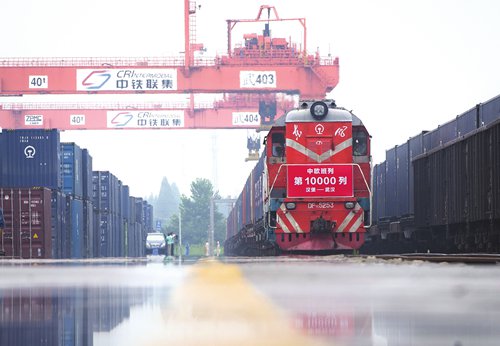China-Europe freight trains steam ahead

Freight train X8044 from Hamburg, Germany, arrives in Wuhan, Central China's Hubei Province on August 26, 2018, marking the 10,000th trip of China-Europe freight rail service. (Xinhua)
On November 14, a cargo train carrying Christmas accessories made in China set off from Yiwu in East China's Zhejiang Province. Four days later, it reached Alashankou, a border city in Xinjiang Uyghur Autonomous Region and headed for Europe from there. After traveling through a number of countries including Kazakhstan, Belarus and Germany, those Chinese products appeared in Christmas markets in Spain's capital Madrid 20 days later.
Since January 2011, over 10,000 cargo trains have traveled on the China-Europe freight rail service network, linking 48 places in China with 42 cities in 14 countries. Over the past few years, the network has developed on three main rail routes. The one from Yiwu to Madrid, or Yixin'ou (Yiwu-Xinjiang-London) is the longest, covering an astonishing 13,052 kilometers.
Feng Xubin, chairman of Yiwu Timex Industrial Investment Co., the only private operator of Yixin'ou, told reporters that a shipment from China to Europe would take 40 days by sea, but only 20 days on train, costing around 20 percent of air freight, he added.
Today, batches of groceries, suitcases and hardware with "Made in China" stickers are being sent to Europe through Yiwu. At the same time, European auto parts, red wine, olive oil and milk powder are also brought to the Chinese people through the route.
Previously, the name of Yiwu used to be associated with the export of cheap household appliances. But now, it has become a commodity distribution hub that is also involved in imports. Reports show that in the first nine months of 2018 the city imported 1,854 kinds of goods from 121 countries, with a with a year-on-year growth of 35 percent. Take the trade collaboration with Spain. Since the launch of the China-Europe freight rail service network, the import of Spanish products to Yiwu has increased from less than $1.6 million in 2014 to $10.105 million in 2017.
Wuhan, Central China's Hubei Province, another link of the railway network, is also attracting investment from a growing number of companies in Europe. According to media reports, Ausnutria Dairy Corporation Ltd, a leading dairy company based in the Netherlands, is planning to relocate its Chinese sales headquarters to Wuhan, after clearing the test over milk powder transportation with Wuhan Han'ou International Logistics Corporation Ltd, a company responsible for the operations of the freight route from Wuhan to Europe. It is estimated that 10 million more cans of milk powder of the company will be imported into China every year after that.
On April 6, 2016, the first Chinese freight train to Lyon in France set off from Wujiashan Railway Center in Wuhan. Since then, Chinese electronic products, optical cable, garments, items of daily use and medical products have been carried to France on the route. More and more wine, cars, cosmetics, shoes, watches and clocks from France have also been entering Wuhan.
At one end lies the emerging East Asia economic group; on the other is located the developed European economic sphere. The China-Europe freight rail service network, a major project of the Belt and Road initiative (BRI) as well as an extension of the nation's four-decade reform and opening-up, is bringing them together, linking countries with huge potential for economic development, and providing substantial business opportunities for Chinese and European enterprises. It's a proof of the pledge by China's top leadership - China's door of opening-up will not be closed and will only open even wider.
This year marks the 40th anniversary of China's reform and opening-up. Amid a sluggish world economy, the continuing implementation of BRI will undoubtedly promote regional development while providing a new driving force for global economic growth.
- China Focus: China-Europe freight trains enhance global supply chains
- Explainer: Why does China-Europe Express Rail expand so fast and become more efficient
- Female workers safeguard power supply for China-Europe freight trains
- GLOBALink | (10 remarkable BRI discoveries by Xinhua int'l reporters) China-Europe freight trains offer cross-border package delivery
- Economic Watch: Chinese guitar-making industry rides on wave of Belt and Road Initiative

